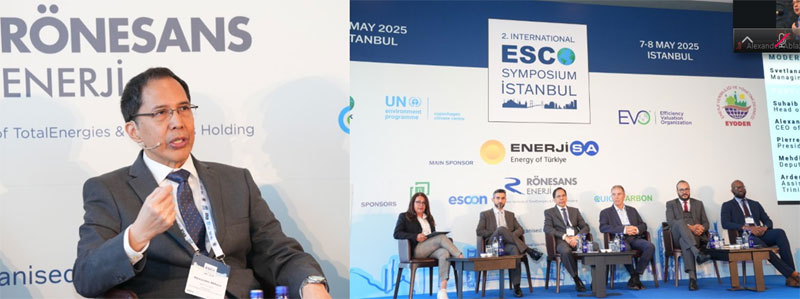Climargy CEO Alexander Ablaza (left photo) joins a Super ESCO panel during the Second International ESCO Symposium held in İstanbul, Türkiye. Right photo (left to right): Svetlana Adamek, Managing Director of adamek & adamek consulting GmbH; Suhaib Al Marzooqi, Head of Business Development of TAQA Energy Services; Alexander Ablaza, CEO, Climargy; Pierre Langlois, President of Econoler; Mehdi Benjelloun, Deputy General Manager, Attijari Capital Management; and, Arden Rodriguez, Assistant Manager of Projects, National Energy Corporation of Trinidad and Tobago Limited (Photo: EYODER, Global ESCO Network)
ISTANBUL, TÜRKIYE, May 7, 2025 – The Global ESCO Network invited Climargy CEO Alexander Ablaza to join a panel of Super ESCO experts during the Second International ESCO Symposium, held from May 7-8, 2025 in at Wyndham Grand İstanbul Levent Hotel & Conference Center in Türkiye.
Ablaza announced that Climargy, as one of the world’s pioneer private super ESCOs, was designed and established to address the market failure for energy efficiency portfolio finance through energy service companies (ESCOs). He said, “Up to 98% of ESCOs across Asia do not have suitable access to bank lending or equity capital to pursue their long-term pipeline of ESCO-financed performance contracts. No energy efficiency aggregators exist nor ‘fund-like’ or ‘super-ESCO’ equity providers of project capital exist as corporate structures across developing or emerging economies. No entity is removing the barriers or de-risking the upfront project development costs especially for investment-grade energy audits for energy efficiency projects in the Philippines. While private capital is moving at a steadily growing velocity toward 20,000 MW renewable energy projects, capital flows toward the 45,900 MW potential energy efficiency improvements remain sluggish.”
The Climargy founder explained that its unique model allows ESCOs to grow their performance contracting pipeline without having to worry about credit limits or recapitalizing the project operations. He said, “ESCOs can focus on what they do best – deliver energy savings.” Ablaza likewise revealed additional benefits for ESCO clients, “Commercial and industrial building owners can now preserve their capital budgets and credit lines for core business priorities. While many of these customers actually have the capacity to allocate capital budgets, such allocations are programmed several years down the road, often competing with higher priority expenditures of its core business. Because of the Climargy model, end-user can implement energy-saving projects without delay.”
Joining Ablaza in the super ESCO panel discussion were: Suhaib Al Marzooqi, Head of Business Development of TAQA Energy Services; Pierre Langlois, President of Econoler; Mehdi Benjelloun, Deputy General Manager, Attijari Capital Management; and, Arden Rodriguez, Assistant Manager of Projects, National Energy Corporation of Trinidad and Tobago Limited. Svetlana Adamek, Managing Director of adamek & adamek consulting GmbH served as moderator of the session entitled, “Aggregation and Financing Through Super ESCOs.”
The 2nd International ESCO Symposium brought together global experts, policymakers, industry leaders, and stakeholders to drive progress toward a low-carbon and energy-efficient future. Through a series of presentations, panels, and discussions, the symposium addressed the latest trends, regulatory frameworks, financing strategies, and success stories in the ESCO market. It highlighted how ESCOs can serve as a key catalyst in scaling up energy efficiency projects, leveraging both public and private sector investments. Additionally, the symposium explored the potential of ESCO frameworks to support the achievement of global climate goals, including the Paris Agreement, while identifying opportunities for enhancing the role of ESCOs in emerging markets and developing countries. This second edition of the annual event was hosted by EYODER – Energy Efficiency and Management Association, in collaboration with the Global ESCO Network, a partnership between the UN Environment Programme Copenhagen Climate Center and the Efficiency Valuation Organization.
Sources: Climargy / Global ESCO Network / EYODER


